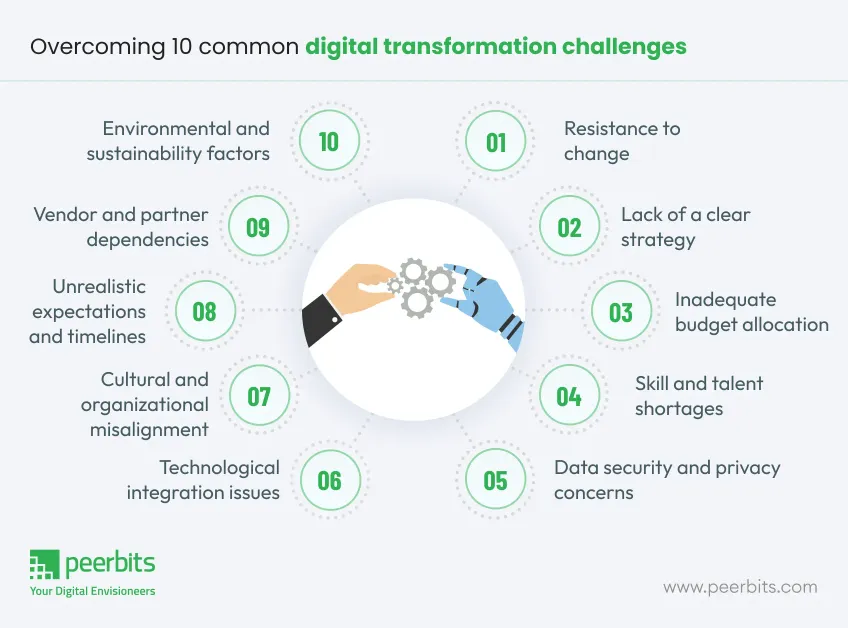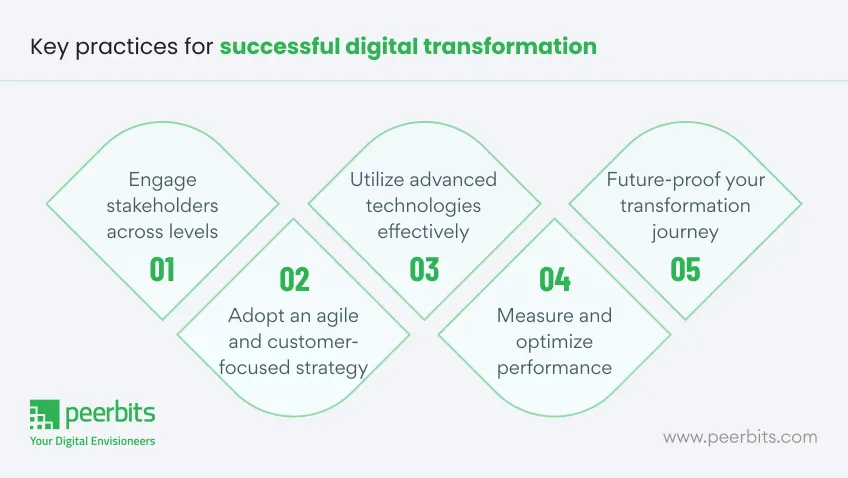Digital transformation has become a necessity for businesses to remain competitive and innovative. It involves integrating digital technologies across all areas of an organization, fundamentally changing how businesses operate and deliver value to customers.
According to Markets and Markets(a well known market researcher) the market is expected to grow from USD 911.2 billion in 2024 to an impressive USD 3,289.4 billion by 2030, companies across industries are prioritizing this evolution.
This rapid growth presents a dual scenario. While it brings opportunities like improved efficiency, better customer experiences, and new revenue avenues, it also poses challenges. Businesses may face obstacles such as resistance to change, lack of clear strategies, and skill shortages.
This blog is about these challenges and provides practical solutions to overcome them. Step by step, we’ll discuss strategies to turn obstacles into opportunities, helping businesses navigate their digital transformation journey with confidence.
Top 10 challenges in digital transformation and their solutions
Digital transformation offers vast potential for businesses but comes with challenges. From employee resistance to technical obstacles, the process can be complex. Well, addressing these challenges with thoughtful solutions can lead to smoother transitions and lasting success.

1. Resistance to change
Challenge: Employees may worry that automation and new tools will disrupt their workflows or make their roles redundant. This hesitation slows the adoption of technologies like CRM systems.
Solution: Communicate openly about the benefits of digital transformation. Involve employees early in the process and provide hands-on training to ease concerns and build confidence.
2. Lack of a clear strategy
Challenge: Undefined goals and poorly structured IT initiatives lead to wasted resources and stalled projects. Without a roadmap, efforts become fragmented.
Solution: Create a detailed plan with measurable goals. Ensure IT projects support broader business objectives, so all teams move toward the same vision effectively.
3. Inadequate budget allocation
Challenge: Limited funds for priority areas and hidden costs during implementation can slow progress and strain resources.
Solution: Focus on high-impact areas with phased investments. Utilize cost-effective technologies and monitor expenses closely to maintain financial stability.
4. Skill and talent shortages
Challenge: Finding experts in AI, IoT, and other advanced technologies is challenging. Teams may lack the necessary expertise for efficient implementation.
Solution: Upskill existing employees through targeted training programs. Use IoT strategically to improve operations and decision-making. Collaborating with experienced technology partners can also cover skill gaps.
Integrating IoT can reduce dependency on manual operations, offering a smart solution to skill gaps. Learn how IoT is transforming industries worldwide.
5. Data security and privacy concerns
Challenge: Cyber threats and evolving regulations like GDPR make data handling more complex. Safeguarding sensitive information becomes critical.
Solution: Conduct regular cybersecurity audits and implement robust encryption techniques. Stay updated on regulatory requirements to avoid compliance issues.
6. Technological integration issues
Challenge: Integrating new tools with outdated legacy systems often disrupts workflows and limits the scalability of operations.
Solution: Use middleware solutions and APIs to connect legacy systems with modern platforms. Gradual migration strategies can minimize operational disruptions.
7. Cultural and organizational misalignment
Challenge: Traditional corporate cultures and resistance to innovation create barriers to transformation. Miscommunication can exacerbate these issues.
Solution: Promote a collaborative culture that values innovation. Involve employees from different departments in decision-making to encourage support and engagement.
8. Unrealistic expectations and timelines
Challenge: Overambitious goals or underestimated timelines can result in delays, budget overruns, and frustration among stakeholders.
Solution: Set achievable milestones and realistic timelines. Provide regular progress updates to maintain transparency and build confidence among stakeholders.
Read more: Top digital transformation strategy with Low Code programming
9. Vendor and partner dependencies
Challenge: Heavy reliance on external vendors may compromise quality and lead to delays or loss of control over key processes.
Solution: Build internal expertise to reduce dependence on vendors. Evaluate vendor performance regularly and maintain a balance between internal resources and external partnerships.
10. Environmental and sustainability factors
Challenge: Balancing technological advancements with eco-friendly practices can be complex, especially with increasing emphasis on sustainability.
Solution: Adopt green technologies and prioritize sustainable strategies in your digital transformation efforts. Focus on long-term environmental benefits while meeting business objectives.
Businesses can navigate their digital transformation with greater confidence and achieve meaningful progress by addressing these challenges with solutions.

Best practices for successful digital transformation
Successfully navigating digital transformation requires more than just technology adoption. It demands strategic planning, strong collaboration, and a commitment to continuous improvement.

Here are best practices to ensure a smooth and successful transformation for businesses.
1. Engage stakeholders across levels
- Involve different departments and teams to ensure the transformation is aligned with the company’s overall goals.
- To build consensus and gain leadership buy-in, demonstrate the potential value and benefits of digital initiatives for the company.
2. Adopt an agile and customer-focused strategy
- Break down the transformation into incremental stages. This authorize for testing, refining, and improving strategies as they are implemented.
- Gather and act on customer feedback to ensure the transformation is meeting their needs and expectations.
3. Utilize advanced technologies effectively
- Use AI and machine learning to improve decision-making through predictive analytics and automation.
- Integrate IoT and blockchain solutions to streamline operations and provide better services to customers.
4. Measure and optimize performance
- Track key performance indicators (KPIs) such as user engagement, process efficiency, and revenue growth.
- Use data analytics to assess the effectiveness of your transformation strategies and continuously refine them for improved outcomes.
5. Future-proof your transformation journey
- Stay informed about evolving technologies and trends that could impact your digital strategy.
- Build flexibility into your business processes and lets your organization adapt to future technological advancements and market shifts.
These practices are designed to guide businesses through their digital transformation journey, helping them stay competitive and adaptable in the dynamic market.
Conclusion
Digital transformation presents its share of challenges, from resistance to change and budget constraints to integrating advanced technologies and addressing security concerns.
With thoughtful strategies like clear goal-setting, effective communication, investing in talent, and utilizing developing technologies, these obstacles can be overcome step by step.
Achieving success in digital transformation isn’t about perfection but persistence. Businesses that holds proper planning, collaboration, and adaptability will navigate these challenges and will also look forward to new opportunities for growth and innovation.
It’s time to turn challenges into stepping stones toward a future-ready organization.

FAQ's
Industries like healthcare, finance, and manufacturing often face significant challenges due to legacy systems, regulatory compliance, and the complexity of integrating new technologies into existing workflows.
Small and medium-sized businesses face budgetary and talent constraints but can benefit from cloud-based solutions and scalable digital tools. Larger enterprises often deal with complex systems and organizational inertia, requiring more extensive planning.
A digital maturity assessment evaluates current technology, processes, and workforce capabilities. It helps identify gaps and prioritize areas for improvement.
Apart from initial investments, hidden costs include employee training, process reengineering, technology upgrades, and ongoing maintenance. Ignoring these can derail transformation efforts.
Adopting phased implementation and dedicating specific teams to transformation projects can help maintain operational continuity while driving innovation.








